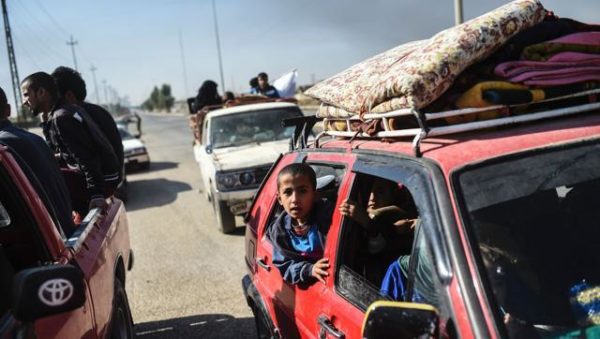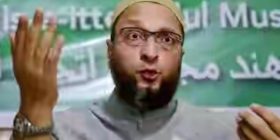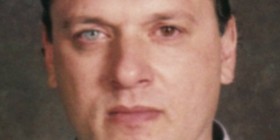As Iraqi troops battled to gain ground a few streets away, soldiers in the Mosul district of Intisar wrapped a wounded and bloodied colleague in a blanket, lifted him off his Humvee, and sped him away from the frontlines for treatment.
Heavy shooting and mortar fire shook the neighbourhood, which the soldiers were trying to recapture from Islamic State militants who have held Mosul for more than two years.
Fighting their way into the city this week, soldiers have gained a foothold in the eastern districts. A trip to the battlefront by Reuters journalists, one of the first visits into Mosul itself, showed the scale of the battle they face.
The thud of explosions boomed across the city streets and black smoke rose from an area about five blocks away. Many buildings were covered in a layer of black soot and one yellow house had a hole blown into it.
“The biggest danger is the vehicles with bombs in them – trucks and cars,” Brigadier Mustafa Sabah Younis said. “They hide (in alleys) between the streets and then come out and attack us.”
He said three-quarters of Intisar had been taken, after a day of advances in which the army says it has seized control of six districts in eastern Mosul — a small fraction of the whole city but a significant breach of the militants’ defence.
“We’re making advances and there are Islamic State corpses,” said another soldier, talking to colleagues by walkie-talkie.
Nearby was an overturned white car, which soldiers said had been driven by a would-be suicide bomber. Close to the vehicle lay a body and two suspected improvised bombs with wires visible.
The battle to drive Islamic State out of Mosul is the biggest ground operation in Iraq since the US-led invasion in 2003, and is likely to decide the fate of the self-proclaimed Islamic State caliphate that has defied the world since 2014.
Some of the army vehicles flew Iraqi national flags, while others had green Shi’ite banners and pictures of the revered Shi’ite imam Ali — religious symbols which could antagonise Mosul’s mainly Sunni Muslim population.
Pools of dirty water lay in garbage-strewn streets that were empty of people. In one house, the remains of meals were still scattered in styrofoam containers and mattresses lay on the floor, as if the dank, smelly room had been briefly and recently commandeered.
A soldier brandished a long, straight sword he said had been found in one of the houses. Elsewhere soldiers danced by the corpse of a dead Islamic State fighter.
A short distance away in the village of Shehrezad on the edge of Mosul, the fighting and deafening explosions barely registered on the faces of children who had lived under Islamic State rule for two years.
A six-year-old girl sat on an Iraqi army weapons crate and recounted how conflict and the radical ideology of the ultra-hardline Sunni militants had shaped her young life.
Unable to attend regular school, which were shut down by the jihadists, she was instead subjected to Islamic State’s version of an education.
“They taught me in their schools that one bullet plus one bullet equal two bullets,” said Anwaar, unmoved by the sound of a car bomb just before she spoke. “They also taught me one gun plus one gun is two guns”.
In her village, a group of soldiers waved their rifles in the air, played music and danced in celebration of their military gains. Army Humvees crowded the street, and nearby a tank fired at Islamic State positions in a village about 1.5 kms away.
A short distance away in the village of Shehrezad on the edge of Mosul, the fighting and deafening explosions barely registered on the faces of children who had lived under Islamic State rule for two years.
A six-year-old girl sat on an Iraqi army weapons crate and recounted how conflict and the radical ideology of the ultra-hardline Sunni militants had shaped her young life.
Unable to attend regular school, which were shut down by the jihadists, she was instead subjected to Islamic State’s version of an education.
“They taught me in their schools that one bullet plus one bullet equal two bullets,” said Anwaar, unmoved by the sound of a car bomb just before she spoke. “They also taught me one gun plus one gun is two guns”.
In her village, a group of soldiers waved their rifles in the air, played music and danced in celebration of their military gains. Army Humvees crowded the street, and nearby a tank fired at Islamic State positions in a village about 1.5 kms away.
In a nearby house, Saleh Yassin explained the difficulties of bringing up children under the shadow of Islamic State.
One of the biggest challenges, he said, was trying to convince his children not to say the word Daesh, a derogatory Arabic acronym used to describe the group.
“We tried for a year to convince them not to say Daesh, because we knew that we would be taken away, imprisoned and whipped,” he said.
Moments later, another blast went off in the neighbourhood. His children showed no reaction.
“We’re used to explosions in Mosul,” said his son Karim, who looked about 11-years-old.
Yassin, a veteranian, said there was only one positive aspect of living under Islamic state.
“There was no crime whatsoever. You could leave your car with the engine on in any street. Everybody knows Daesh cuts the hand off any thief.”






Leave a reply